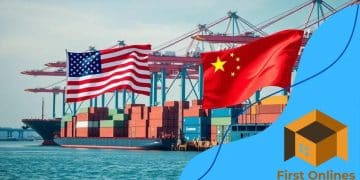The growing influence of China in global tech markets

Anúncios
The growing influence of China in global tech markets is reshaping industries through advancements in artificial intelligence, telecommunications, and renewable energy, impacting international trade and global supply chains.
The growing influence of China in global tech markets is transforming the landscape of technology on a global scale. Have you noticed how Chinese innovations are everywhere? This article explores these shifts and their implications for the future.
Anúncios
China’s rise as a global tech power
China’s rise as a global tech power has been swift and significant. Over the past few decades, the nation has transformed its technological landscape, emerging as a leader in various tech sectors. With massive investments in research and development, China is no longer just a manufacturing hub; it is a frontier of innovation.
One of the key aspects of this transformation is the government’s strong support for the tech industry. By providing funding and creating favorable policies, the Chinese government has fostered an environment where technology can flourish. Companies like Huawei and Tencent have led the charge, pushing boundaries in telecommunications and digital services.
Innovative Projects and Startups
China’s startup ecosystem is booming, with cities like Beijing and Shenzhen becoming hotspots for entrepreneurs. These cities host numerous accelerators and incubators that nurture new ideas.
Anúncios
- Investment in artificial intelligence (AI)
- Advancements in telecommunications
- Rapid growth in e-commerce
- Expanding influence of fintech solutions
The involvement of tech giants has further catalyzed innovation. For instance, Didi Chuxing has revolutionized ride-hailing services, while Alibaba has transformed how people shop online. This shift illustrates the dynamic nature of China’s tech market.
Global Implications
As China’s technological prowess grows, its influence on global markets is undeniable. Other countries must adapt their strategies to remain competitive. Businesses worldwide are increasingly looking to collaborate with Chinese tech companies to leverage their innovations.
Moreover, the integration of technology into daily life, from smart cities to connected devices, reflects China’s ambitions. This is shaping the way we approach urban planning and lifestyle choices.
In conclusion, China’s rise as a global tech power is marked by a vibrant ecosystem of innovation and growth. As it continues to evolve, the implications for global tech markets will be profound, impacting competition, collaboration, and consumer behavior.
Key sectors influenced by China’s tech policies
Key sectors influenced by China’s tech policies showcase how the country’s strategic direction is shaping industries across the globe. These policies have resulted in significant advancements in various fields, making China a leader in technology and innovation.
The focus on technology has led to remarkable developments in telecommunications. Companies like Huawei and ZTE have pushed the envelope with their pioneering solutions. This transformation highlights how Chinese tech companies have become major players on the world stage, influencing communications infrastructures worldwide.
Artificial Intelligence
Another critical sector is artificial intelligence (AI). China aims to become the world leader in AI by 2030, and significant investments have been made to achieve this goal. Startups and established companies are collaborating to create AI applications across industries.
- Facial recognition systems for security
- AI in healthcare for diagnostics
- Smart cities powered by AI analytics
- Automated customer service solutions
Furthermore, the e-commerce sector has seen astonishing growth due to supportive tech policies. Companies like Alibaba and JD.com have revolutionized online shopping experiences, making it easier for consumers to access a variety of products. This growth is largely attributed to robust digital payment systems and logistic networks.
Fintech Innovations
Fintech is another area where China’s policies have fostered innovation. Mobile payment solutions, such as Alipay and WeChat Pay, have reshaped the financial landscape, allowing seamless transactions. With a significant portion of the population using digital wallets, it has become a blueprint for financial services.
The push towards green technology is also noteworthy. China has invested in renewable energy solutions to reduce its carbon footprint. This has led to advancements in electric vehicles and solar energy production, positioning China as a global leader in green tech.
In summary, China’s policies are shaping multiple sectors by driving advancements in technology and innovation. The influence of these key sectors will undoubtedly continue, affecting global markets and international cooperation.
Implications for international trade

Implications for international trade have become increasingly significant as China’s technological influence grows. As China establishes itself as a tech powerhouse, global trade dynamics are shifting to accommodate these changes. Countries worldwide are beginning to adapt their trade policies to align with China’s technological advancements.
One major implication is the rise of export dependency. Many nations find themselves relying heavily on Chinese technology for their infrastructure and manufacturing needs. This dependency can lead to vulnerabilities, especially in times of political or economic instability.
Trade Agreements and Partnerships
Trade agreements between China and various countries reflect these shifts. Belt and Road Initiative is a prime example, as it facilitates investments in infrastructure across Asia, Europe, and Africa. Through this initiative, China is expanding its influence and access to new markets.
- Enhanced connectivity for trade routes
- Increased investments in developing countries
- Promotion of Chinese technology in foreign markets
- Creation of trade networks benefiting Chinese companies
Furthermore, the integration of Chinese tech products in global markets is reshaping industry standards. As more countries adopt Chinese technologies, there may be a push for international regulations to accommodate these innovations.
Competitive Landscape
China’s growing tech footprint also influences the competitive landscape. Countries with strong tech sectors must innovate to keep pace with Chinese advancements. This competition pushes nations to invest in their研发 (research and development) capabilities to develop cutting-edge technologies.
The movement towards a digital economy is also impacted. As China excels in e-commerce and digital finance, other nations may need to rethink their approaches to international trade to remain competitive in the global market.
Therefore, as China continues to expand its tech capabilities, the implications for international trade will resonate across industries and countries. Adapting to this changing landscape will be essential for global economies to thrive.
The impact on global supply chains
The impact on global supply chains has become increasingly evident as China’s position in technology continues to rise. China’s technological advancements are reshaping how goods are produced and distributed worldwide, making it a central player in global supply chains.
One major effect is the increased efficiency in manufacturing processes. With the adoption of advanced robotics and automation, Chinese factories are able to produce high-quality goods at a faster rate. This capability attracts businesses from other countries to rely on Chinese manufacturers for their needs.
Resilience and Vulnerability
While China’s role enhances efficiency, it also creates vulnerabilities. Many companies depend heavily on Chinese suppliers for critical components. This dependence can lead to disruptions when issues arise, such as political tensions or natural disasters affecting operations in China.
- Delays in production due to supply chain disruptions
- Increased costs from finding alternative suppliers
- Potential loss of market share for businesses relying solely on China
- Need for diversified sourcing strategies to mitigate risks
Moreover, the COVID-19 pandemic highlighted how fragile supply chains can be. When factories shut down in China, companies across the globe faced unprecedented delays and shortages, prompting businesses to rethink their supply chain strategies.
Innovation in Logistics
China’s tech innovations are also improving logistics and shipping solutions. Technologies such as AI and big data analytics allow for better inventory management and predictive analysis. These advancements help companies anticipate demand and streamline operations.
Companies are increasingly using smart logistics to enhance delivery speeds. This use of technology reduces costs and ensures that products reach consumers in a timely manner. As a result, e-commerce businesses are experiencing rapid growth, driven by improved supply chain management.
In summary, the impact of China’s technological advancements on global supply chains is profound. These changes create opportunities and challenges that businesses must navigate to remain competitive in the evolving marketplace.
Future predictions for China’s tech advancements
Future predictions for China’s tech advancements indicate a significant trajectory of growth and innovation in various sectors. As China continues to invest heavily in research and development, the implications for the global tech landscape will be profound.
Experts believe that by 2030, China could emerge as the global leader in artificial intelligence. With ambitious government policies and investments, the nation is set to push boundaries in fields such as machine learning and deep learning.
Advancements in Key Technologies
In addition to AI, other areas like quantum computing are expected to see rapid progress. China’s commitment to becoming a powerhouse in quantum technology could redefine computing, offering immense power for complex problem-solving.
- Development of quantum networks for secure communication
- Breakthroughs in materials science
- Usage of quantum computing in pharmaceuticals
- Increased investment in quantum startups
Moreover, the rise of 5G technology will serve as a backbone for internet connectivity and smart devices. This infrastructure will enhance everything from telecommunications to autonomous vehicles, making cities smarter.
Impact on Global Markets
The influence of China’s tech advancements on global markets cannot be understated. As Chinese companies become increasingly competitive, other nations will likely need to adapt their strategies to keep pace. This change will drive collaboration and innovation globally.
Additionally, sectors like renewable energy are poised for growth, as China leads initiatives for sustainable technology. Investments in solar and wind energy will not only benefit the environment but also expand China’s footprint in global energy markets.
Overall, the future of China’s tech advancements promises to bring innovation and change. As the country leads the way in various technologies, the ripple effects will shape industries and economies worldwide, pushing the boundaries of what is possible.
FAQ – Frequently Asked Questions about China’s Growing Influence in Tech Markets
How is China’s technological advancement impacting global competition?
China’s advancements are raising the bar for global competition, pushing other countries to innovate and adapt their strategies.
What are the key sectors affected by China’s tech policies?
Key sectors include artificial intelligence, telecommunications, renewable energy, and e-commerce, all experiencing rapid growth due to supportive policies.
How does China’s tech influence affect international trade?
China’s technology leads to increased export dependency, requiring countries to adapt their trade agreements and sourcing strategies.
What are the implications for global supply chains due to China’s tech advancements?
Global supply chains are becoming more dependent on Chinese technology, which can create vulnerabilities and necessitate diversifying supplier relationships.





